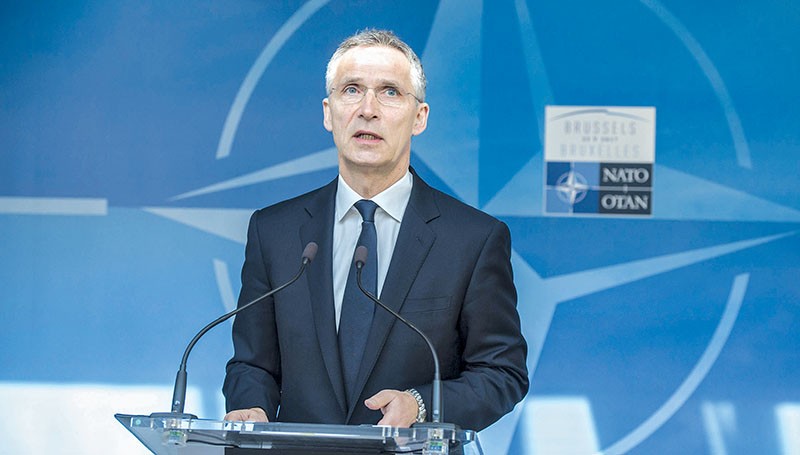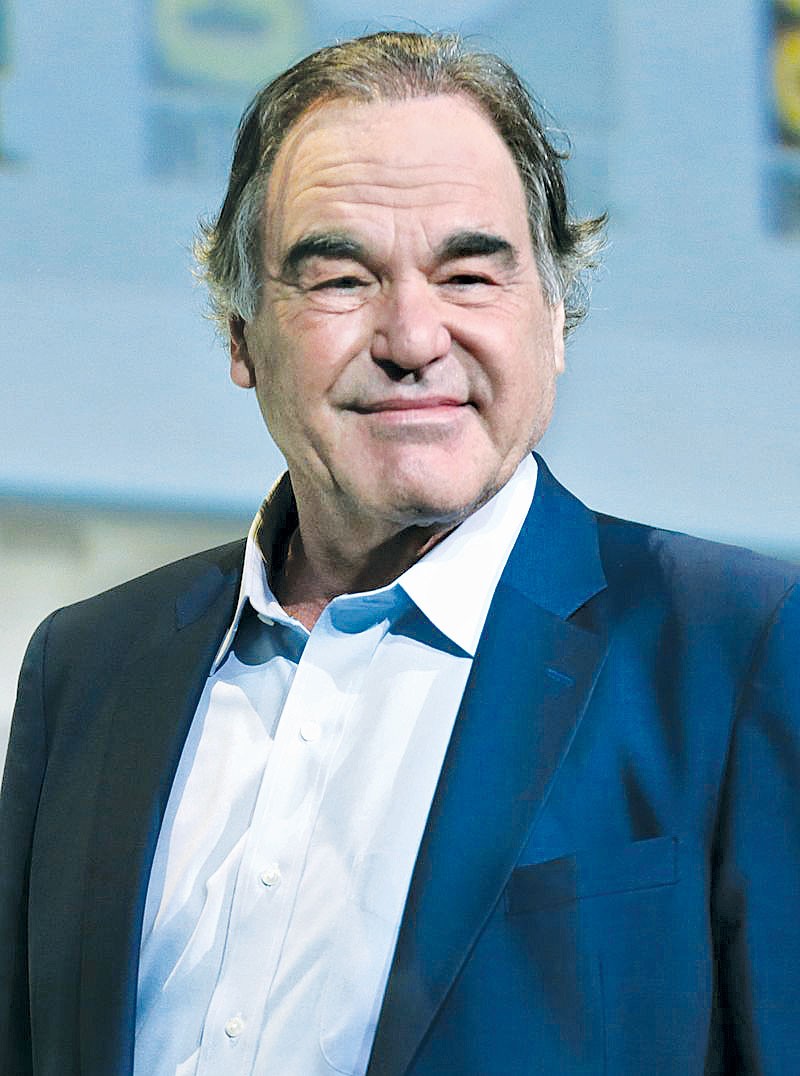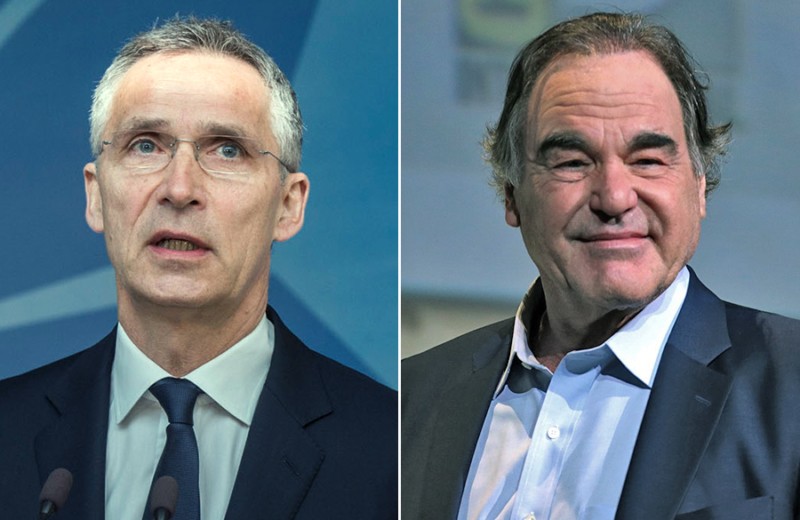Editor’s Note: This feature separates Ukraine’s friends from its enemies. The Order of Yaroslav the Wise has been given since 1995 for distinguished service to the nation. It is named after the Kyivan Rus leader from 1019-1054, when the medieval empire reached its zenith. The Order of Lenin was the highest decoration bestowed by the Soviet Union, whose demise Russian President Vladimir Putin mourns. It is named after Vladimir Lenin, whose corpse still rots on the Kremlin’s Red Square, 100 years after the October Revolution he led.
Jens Stoltenberg – Order of Yaroslav
The Wise

When the Kremlin looks at NATO, it sees an organization equal in form and purpose to the defunct Warsaw Pact. Like NATO, the pact, formed in 1955, was nominally a collective defense organization, headed by a superpower. But there the resemblance ends.
Absurdly, members of this collective defense organization were twice invaded by fellow members: Hungary in 1956 (by the Soviet Union), when Budapest attempted to withdraw from the alliance, and Czechoslovakia in 1968 (by the Soviet Union, Bulgaria, Hungary and Poland), when Prague attempted liberalization.
And while the United States and the Soviet Union were the leading members of their respective organizations, the Soviet Union dominated the Warsaw Pact militarily, politically and ideologically, in a manner that is unacceptable for the United States within NATO.
Russia is thus confused by NATO, especially when it sees former Warsaw Pact members and even former Soviet republics, joining. Equating NATO to the Warsaw Pact, the Kremlin assumes that the U.S. must have coerced these states into joining, as the Soviet Union did with the seven other Warsaw Pact members.
Luckily for Ukraine, NATO General Secretary Jens Stoltenberg is not confused. The former Norwegian prime minister, who became head of the alliance in October 2014, after Russia had established two proxy states in the Donbas with the aim of destabilizing Ukraine and sabotaging its hopes for European Union and NATO membership, knows what the Kremlin is up to — and where it gets things completely wrong.
Stoltenberg has given consistent support to Ukraine, a non-NATO state. At the most recent heads of state meeting in Brussels on May 25, neither Stoltenberg nor NATO let Ukraine be forgotten. Russia’s war on Ukraine, as Stoltenberg repeatedly points out, is the reason why NATO members are increasing their defenses.
Under Stoltenberg, the alliance has rightly suspended cooperation with Russia. NATO also startedfive trust funds to support reform of Ukraine’s security and defense sectors, and enhance Ukraine’s defense capability. The trusts include projects to improve Ukraine’s cyber security, provide medical rehabilitation for combat casualties, and upgrade military logistics, command and control functions. Although weakly funded, they are a start. The alliance is also helping Ukraine bring its armed forces up to NATO standards.
Stoltenberg, a principled and diplomatic leader, is Ukraine’s friend in this fight. The Kremlin’s error is to regard the organization he leads as Russia’s inevitable foe. It is not. Russia’s invasions of its neighbors are the reason for today’s animosity. NATO is needed as much as ever.
Oliver Stone – Order of Lenin

Oscar-winning U.S. director Oliver Stone has made some good movies, but he’s also made a fair number of turkeys, especially in recent years.
Thus, we should probably be getting the knives and forks out for “The Putin Interviews” — a series of interviews Stone has conducted with the Russian leader over the last two years, set to be aired by Showtime over four days in June.
That’s because Stone, whenever he’s set his lens on contemporary politics, has invariably produced a picture of events so distorted by his own views that it’s unrecognizable to anyone acquainted with the real situation.
Take his 2009 feature-length documentary “South of the Border” with seven Latin American presidents, which Stone hoped would win more sympathy in the West for the socialist policies followed in South America by the likes of Hugo Chavez, the late former leader of Venezuela.
Chavez, a self-described Marxist, introduced in his country a new brand of socialism as an answer to capitalism’s failure to address poverty, hunger and exploitation.
It hasn’t been a success: According to a recent study, Venezuelans have on average lost 19 pounds due to hunger brought from the economic chaos in their country, as Nicolas Maduro continues Chavez’s policies.
Yet Stone never bothered to interview Chavez’s opponents for “South of the Border,” saying he wanted to “balance” the negative coverage Chavez’s regime was getting in the West.
Given what Stone has had to say about Ukraine and its EuroMaidan Revolution that drove out a dictator on Feb. 22, 2014, we can expect similar ridiculousness from him in “The Putin Interviews.”
According to Stone, the massive public uprising that ousted Ukraine’s corrupt, thuggish Viktor Yanukovych was all a U. S. Central Intelligence Agency conspiracy carried out by armed neo-Nazi radicals.
That sounds like a great plot for a fiction movie, but it’s nowhere close to reality. The truth is that the revolution had overwhelming popular support for justifiable reasons.
But Stone will no doubt keep parroting Kremlin propaganda in his “Putin Interviews.”
In one interview about the upcoming film, Stone says this about Putin: “The man speaks articulately about what the Russian interests are in the world and I would say to you that they’re not about empire, or expansion, or aggression, or a return to the old days.”
Really? Have you looked at a map of Ukraine recently, Stone? Talk to people in Ukraine, Georgia, Moldova, the Baltics and Poland about Putin’s so-called lack of imperial ambitions. For his unerring ability to lose the plot, mask the truth and mislead the movie-going public, Stone wins the Order of Lenin.



